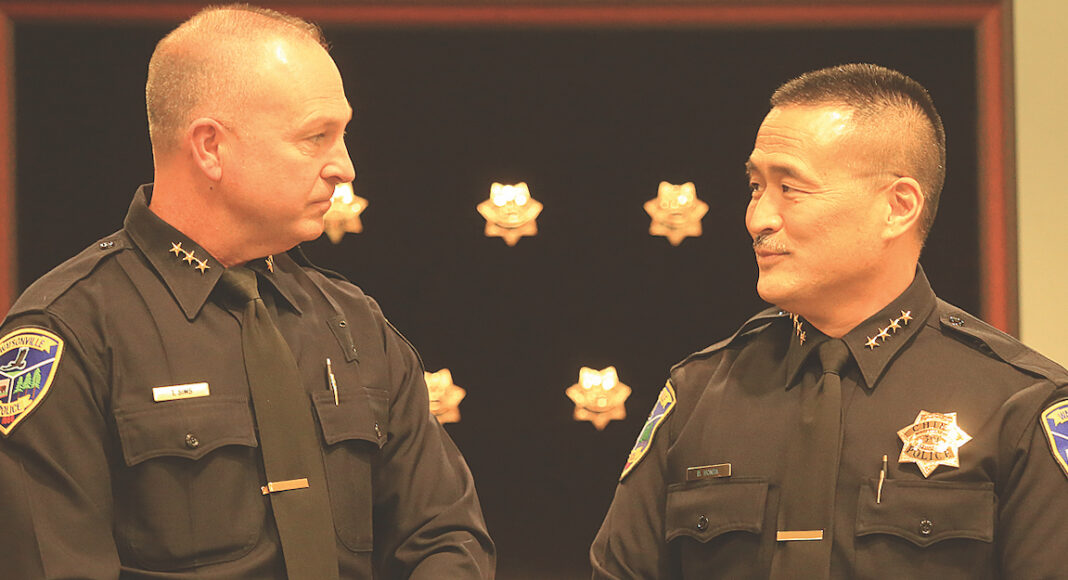By Aiyana Moya
Balance is critical to being a good police chief, says interim Watsonville Police Department Chief Thomas Sims.
“I started my career over 30 years ago,” Sims says. “And so I’ve seen a lot of good [police chiefs], and I’ve seen bad ones. And the good ones are the ones that can balance their engagement with the community, with the city that they’re working for and with their own department members.”
It’s this capacity for balance that Sims hopes the new Watsonville police chief will have.
Last month, Watsonville Chief David Honda retired after five years with the department and more than 30 years in law enforcement. Capitola is also in the midst of a search for a new police chief, with Chief Terry McManus set to retire at the end of the year. Both retirements come following a year of increased scrutiny for law enforcement agencies throughout the country.
Officers have had to navigate in real time how to enforce pandemic protocols while also dealing with calls for police reform following the killing of George Floyd at the hands of Minneapolis police. Chiefs across Santa Cruz County publicly condemned Floyd’s murder, and Santa Cruz Police Chief Andy Mills and Chief Honda knelt in solidarity at protests in their respective cities in the days after. But some community members called these acts of solidarity hypocritical; at the same time Mills and Honda took a knee at local Black Lives Matter protests, Santa Cruz County police were in riot gear at the Oakland protests.
“So you took a knee. Anyone can do that. And I understand your intent, but, you know, the road to hell is paved with good intentions,” says former Education and Training Manager at the Diversity Center Lesley-Reid Harrison. “I think that you really need to be doing the work within the community, and taking the lead of the local community.”
It was a moment where balancing community concerns, supporting their own department and executing policy duties came to a head.
“Sometimes, there are situations where police officers are at odds with the community,” Sims says.
Community Connection
The relationship between police and the community they serve has been in flux since the very inception of law enforcement, and the role of a police chief has evolved, as well.
But during the early 1900s, police departments were at their most distant from their communities, as a nationwide move toward professionalization—where the prevailing ideology was that police knew best—resulted in the separation of the police from the community, according to the Bureau of Justice Assistance. It was the 1960s era of protests, led by the Black civil rights movement, that reinvigorated the conversation around community and police relationships.
Since then, there has been an ever-increasing emphasis on police chiefs providing opportunities for the community to give feedback to police departments. Both Chief McManus and Chief Sims say their respective police departments have worked to create these opportunities for community feedback and engagement.
“We’ve worked very hard to develop those relationships with our community, so that when we do make a mistake or something bad happens there, [community members] at least come into the conversation with an open mind, and we can have a civil conversation with them,” Sims says.
Last year, in an attempt to incorporate community feedback and demonstrate his commitment to accountability, then-Chief Honda created an Ad-Hoc Committee on Policing and Social Equity, a group that over the last nine months has performed community outreach to hear residents’ concerns about the Watsonville Police Department. Whether the city is receptive to these concerns remains to be seen.
In Capitola, Chief McManus says the department implements community policing through its Neighborhood Watch program and offers in-person officer response to every report of an incident.
“That’s where community policing starts. Because if you present yourself in a professional, respectful and kind manner, as an officer to a citizen, they’re likely to return that story to their neighbors, and they’re likely to share feedback about the Capitola Police Department,” McManus says.
As far as community oversight or input, the chief relies on residents to bring concerns to city council meetings or directly to officers.
“As a small city, city council meetings are a fantastic way to engage with the community as police department heads in the city,” McManus says.
Balancing Act
It’s always been important for police officers, especially police chiefs, to be knowledgeable on the social issues happening around the country and in the city they serve, says Dr. Ginger Charles, who serves as the chair of the Criminal Justice program at Cabrillo College, and has taught more than 100 police officers—including a few who went on to become police chiefs.
The events of the past year, however, have demanded police chiefs possess a more substantial understanding of social justice issues. In response, State Community College Chancellor Eloy Ortiz Oakley issued a call-for-action statement that encouraged the rethinking of police training, and mandated that all police curriculum begin to incorporate social justice concepts. However, that curriculum is very, very slow to change, says Charles, as curriculum and ideology shifts from a warrior to guardian mentality.
“I put it within all my courses—there’s always a flavor of social justice, so there’s room for discussion. But we need to start to see that within all police academies, and then hopefully within training—or retraining—within police departments,” Charles says.
Social issues seemed to hit an apex in 2020. Monarch Services, a Watsonville organization that responds to domestic violence calls, reported a 75% increase in services last year. According to the Centers for Disease Control and Prevention, adults across the U.S. reported considerably elevated adverse mental health conditions associated with the Covid-19 pandemic and the social issues the deadly virus left in its wake. Santa Cruz County as a whole has one of the highest per-capita rates of homelessness in the state—an issue that was only exacerbated by the pandemic.
Although the responsibility to find the solution to and address these problems falls on the community as a whole, police are often the first responders to civilians experiencing these issues.
“That’s the difficult part of policing today. We have these social problems that probably should be handled in other programs, but those programs don’t have the resources, and they’re really not equipped to handle the level of violence that we will usually see within those calls,” Charles says.
There are opportunities for the police department to engage with the resources available to help address these concerns, especially when it comes to training, says Co-Director of the Diversity Center Deanna Zachary.
While the Watsonville police department has done workshops with the Diversity Center, an organization dedicated to helping professionals understand specific needs of the LGBTQ+ community, Zachary says she still hears stories of discrimination.
“Lots of people share their own stories of discrimination at the hands of the police because of being LGBTQ,” Zachary says. “I think that the police chief sets the tone for the department. Not only coming into how they interact with LGBTQ folks, but in terms of, you know, setting up trainings on implicit bias towards LGBTQ folks and communities of color.”
Funding is an important part of the police department’s capacity for training and workshops to address social issues, McMancus says. He acknowledges that social issues, like mental health and homelessness, are some of the biggest challenges the department faces, and he is open to the reallocation of money in order to support a program that is better suited to provide the most effective services to a person in need. But, he says, “we often struggle to find the funding sources to access the minimum level of training that we all think we need.”
Harrison agreed with Zachary and said that police chiefs must also follow through on the commitments made to the community regarding social justice issues and police reform. At a protest she attended, she said she saw Watsonville police high-fiving Blue Lives Matter protesters who were harassing Black Lives Matters protesters.
“I just thought it was very telling that the police officers, how they reacted with the people who were Blue Lives Matter folks … you’re meant to be police officers, you’re meant to be looking at the quote-unquote ‘neutrality’ of the law. And yet clearly you’re favoring one group of people over the other,” Harrison says.
Both Sims and McManus say their police department supports Black Lives Matter protests. At the same time, Sims expresses frustration that his department has been criticized for the behavior of a police officer on the other side of the country.
“Things that happened 3,000 miles away, our police department is getting blamed for. Do you think that’s fair? I don’t. I don’t think that’s fair, because that’s not our police department,” Sims says.
Regardless of where police brutality occurs, its effects will be felt by communities across the country, Charles says.
“Everything that happened with former officer [Derek] Chauvin, the police officers in Santa Cruz will have to respond as if it happened within their city,” Charles says. “They may say it’ll never happen here. Well, that may be true, but you’re going to feel the effects and you’re actually going to be policing to the effects.”
A police chief shapes a department, and his or her responsiveness to community concerns and partnership with local issue-driven organizations will help determine the progress on important social issues Santa Cruz county faces. As Capitola and Watsonville look for new police chiefs, balancing these relationships will be important—but perhaps equally important will be finding someone who will be adaptable, maybe even a proponent of change, as we close a year of unpredictable and unprecedented events.
“Law enforcement, typically across the United States, does not necessarily like to give up authority. [But there is] pressure on law enforcement to change, because the communities, all the communities are saying this is how we want it done now, because we don’t feel it was equitable or somebody overstepped … and so we’re going to change it,” Charles says.
Capitola will be having a community meeting regarding police chief recruitment Monday, August 23 from 6-8pm, open to the public. Location to be determined.











